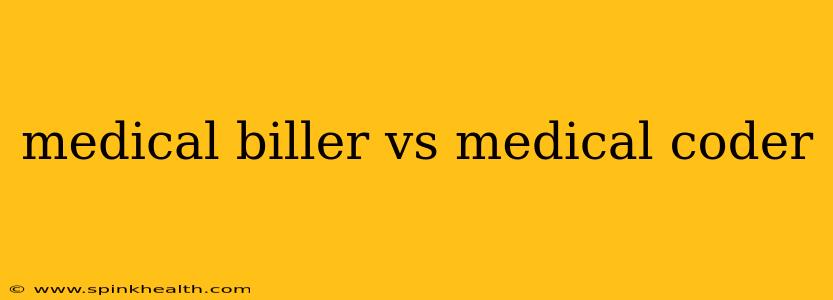Medical Biller vs. Medical Coder: Unveiling the Differences in These Crucial Healthcare Roles
The healthcare industry hums with activity, a complex symphony of patient care, treatments, and administrative tasks. Two vital roles within this orchestra are the medical biller and the medical coder. While both contribute to the smooth functioning of healthcare practices, their responsibilities differ significantly. This article will delve into the distinct worlds of medical billing and coding, clarifying their unique functions and illuminating the paths these professionals take.
Imagine a bustling doctor's office. Patients are seen, diagnoses are made, and treatments are administered. But the work doesn't end there. That's where the medical coders and billers enter the stage. They are the unsung heroes, ensuring that the healthcare provider gets paid for their services and that accurate records are maintained for both the provider and insurance companies.
What Does a Medical Coder Do?
A medical coder acts as a translator, converting the clinical documentation of patient encounters – the doctor's notes, lab results, and diagnostic imaging reports – into numerical and alphanumeric codes. These codes, based on standardized classification systems like ICD-10 (International Classification of Diseases, 10th Revision) for diagnoses and CPT (Current Procedural Terminology) for procedures, are the language understood by insurance companies. Think of it as transforming a narrative into a precise, numerical code that summarizes the patient's visit. Accuracy is paramount; a single incorrect code could result in denied claims or delayed payments.
The work is detailed and requires a keen eye for precision. Medical coders must thoroughly understand medical terminology, anatomy, physiology, and the intricacies of coding systems. They are the gatekeepers of accurate medical record-keeping, ensuring that the information is properly categorized and available for analysis and reporting.
What Does a Medical Biller Do?
While medical coders create the codes, medical billers take those codes and create claims. They're the financial architects of the healthcare system. They take the coded information, along with patient demographics and insurance details, and submit the claims to insurance companies for reimbursement. Their work is about navigating the complex web of insurance policies, payer requirements, and billing regulations. They pursue timely payments, resolve claim denials, and manage accounts receivables.
A medical biller’s day is filled with interaction with insurance companies, managing patient accounts, and chasing down outstanding payments. They are adept at problem-solving, using their knowledge of insurance regulations and billing practices to maximize reimbursements for the healthcare providers.
What are the Key Differences Between Medical Billing and Medical Coding?
The differences between these two roles are clear, although they often work in tandem.
Medical Coding:
- Focus: Translating medical documentation into standardized codes.
- Skills: Medical terminology, anatomy, physiology, knowledge of coding systems (ICD-10, CPT, HCPCS).
- Outcome: Accurate medical records and codes for billing purposes.
Medical Billing:
- Focus: Submitting claims to insurance companies and managing the revenue cycle.
- Skills: Insurance knowledge, billing software proficiency, accounts receivable management, strong communication skills.
- Outcome: Timely payments for healthcare services.
What is the job outlook for medical billers and coders?
Both medical billing and coding are expected to grow significantly in the coming years. The aging population, increasing demand for healthcare services, and the complexity of insurance plans will continue to fuel this growth, making these roles essential for the healthcare industry.
How much do medical billers and coders make?
Salaries for medical billers and coders vary based on experience, location, and employer. However, both roles offer competitive compensation and potential for advancement within the healthcare industry.
What education and certification are required?
While formal education isn't always mandatory, obtaining certifications such as the Certified Professional Coder (CPC) or Certified Billing and Coding Specialist (CBCS) can significantly enhance job prospects and earning potential. Many community colleges and vocational schools offer programs in medical billing and coding.
Can I become a medical biller and coder?
Many individuals successfully work in both roles, though it's not always necessary. Some professionals specialize in coding, while others focus on billing. The choice often depends on individual skills and interests. The skills acquired in one role often complement the other, making it possible to transition between the two.
In the end, both medical billers and coders are essential components of a well-functioning healthcare system. They play crucial roles in ensuring that healthcare providers are compensated for their services, that accurate records are kept, and that the complexities of healthcare financing are managed efficiently. They are the silent partners in patient care, ensuring the smooth operation of the entire system.

